

Liquid Democracy – Jim Rutt. What It Is and Why It’s Important By Jim RuttMini-bio America’s democratic institutions are unable to meet today’s major challenges.
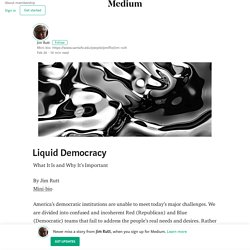
We are divided into confused and incoherent Red (Republican) and Blue (Democratic) teams that fail to address the people’s real needs and desires. Rather than face the severe local, state, national, and global problems before us — from infrastructure decay to climate change to ever-mounting national debt and ever-growing income inequality — we get gridlock and kicking the can down the road. One alternative to the politics of Team Red and Team Blue is known as “Liquid Democracy.” Democracy Is Getting A Reboot On The Blockchain.
In 2013, a group of activists in Buenos Aires attempted an experiment in what they called hacking democracy.

Representatives from their new political party would promise to always vote on issues according to the will of citizens online. Could Technology Remove the Politicians From Politics? - Motherboard. The tech industry has talked long and hard about democratizing industries.

Democratizing content, democratizing taxi-cabs, and democratizing bed and breakfasts. Social Voting Systems. 2012-03-30-Angel_Tchorbadjiiski-Diploma-Thesis.pdf (application/pdf Object) Clay Shirky: How the Internet will (one day) transform government. Democracy: upgrade = (re)Public – (r)evolution - (h)activist - H(e)art-h. A bulwark against the Super PACs: The Internet - The Hill's Congress Blog. Liquid Democracy: Web Platform Makes Professor Most Powerful Pirate. Fed up with politics? Join the "Pirate Party" By Fareed Zakaria, CNN This past week, New York might have seemed to be the center of the world.

But the political story that struck me came not from the corridors of the United Nations but thousands of miles away in the city-state of Berlin, Germany. You might have heard about the group called "The Pirate Party" that has burst on to Germany's political scene. The Economist magazine jokingly writes that it sounds like a party whose name was dreamed up at Octoberfest, Germany's annual beer festival.
Actually, its ideology centers around internet freedom. Well, it turns out their movement was founded in Sweden five years ago with a focus on copyright and patent law. The Pirate Party Logs a New Politics. THE sudden roar erupting from the Jägerklause bar in east Berlin’s bohemian Friedrichshain district late on a recent Sunday sounded like the usual soccer-match pandemonium.

But the crowd inside, with their jeans and sneakers and easygoing looks, didn’t seem like typical soccer fanatics. Nor did they look like political operatives — but that’s what they were: members of the upstart Pirate Party, which had just scored a key electoral victory in the small western state of Saarland. The German Pirates, founded in 2006 and long dismissed as a niche party obsessed with copyright reform and online privacy, picked up four seats in the Saarland regional Parliament, twice as many as the once strong Green Party — and far more than the pro-business Free Democrats, who were shut out. This month they face their biggest challenge, with elections in two more states, including North Rhine-Westphalia, the country’s most populous.
Direct Democracy, 2.0. Angelika Warmuth/DPA, via Agence France-Presse — Getty Images Members of the Pirate Party attended a conference in Neumünster, Germany, last month.
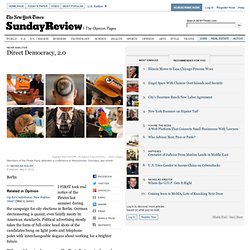
I FIRST took real notice of the Pirates last summer during the campaign for city elections in Berlin. German electioneering is quaint, even faintly musty by American standards. Political advertising mostly takes the form of full-color head shots of the candidates hung on light posts and telephone poles with interchangeable slogans about working for a brighter future.
Pirate Party Interview: Andreas Nitsche on LiquidFeedback - California Pirate Party. Delegative democracy. Delegative democracy is a form of democratic control whereby voting power is vested in delegates, rather than representatives.
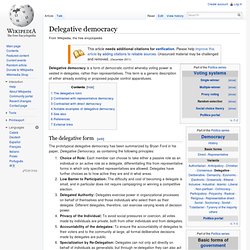
This term is a generic description of either already existing or proposed popular control apparatuses. The delegative form[edit] Proxy voting. Proxy voting is a form of voting whereby some members of a decision-making body may delegate their voting power to other members of the same body to vote in their absence, and/or to select additional representatives.

A person so designated is called a "proxy" and the person designating him or her is called a "principal". Proxy appointments can be used to form a voting bloc that can exercise greater influence in deliberations or negotiations. Proxy voting is a particularly important practice with respect to corporations; in the United States, investment advisers often vote proxies on behalf of their client accounts.[1] The United States parliamentary manual Riddick's Rules of Procedure notes that, under proxy voting, voting for officers should be done by ballot, due to the difficulties involved in authentication if a member simply calls out, "I cast 17 votes for Mr.
X Proxy voting is also an important feature in corporate governance through the proxy statement. LiquidFeedback Introduction. LiquidFeedback – Interactive Democracy. Mission Statement « LiquidFeedback – Interactive Democracy. Interactive Democracy using Liquid Democracy.
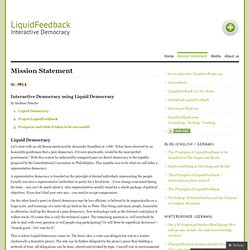
Liquid Democracy e.V. Liquid Democracy. Theoretical foundations. The association offers a platform to discuss central concepts dealing with participative democracy.
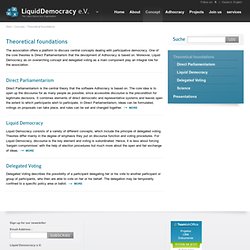
Direct Parliamentarism. In terms of Direct Parliamentarism we work on a concept that links advantages of the parlamentary system to the capabilities of direct democracy. Thereby, we put special emphasis on the applicability of the concept of Direct Parliamentarism to all areas of society in which people want to develop solutions in a discursive process according to democratic standards. This applies to parties, associations, parliaments, as well as other organisations. - Adhocracy. Public Software Group e. V. · LiquidFeedback. LiquidFeedback is an open-source software, powering internet platforms for proposition development and decision making. LiquidFeedback is an independent open source project published under MIT license by the Public Software Group of Berlin, Germany. The developers of LiquidFeedback have joined together in the Interaktive Demokratie association to promote the use of electronic media for democratic processes.
For general information about the software, visit liquidfeedback.org. Technical information and download below. Current version: LiquidFeedback 3.2. Liquid Democracy Association. = promoting and creating software tools for deliberative democracy ... URL = "The Liquid Democracy Association is a non-profit and non-partisan organisation that works on innovative ideas and projects for democratic participation. Our goal is to establish a transparent democratic principle in both the political and social domain based on strengthening the citizens’ participation.
We are working on ideas and projects that will make our modern democracy more transparent and flexible. Online Voting in U.S., Despite Risks, Should Be Developed. Timothy A. Clary/Agence France-Presse — Getty ImagesPeople waiting to vote in Boston. Last Tuesday, millions of Americans stood in long lines to cast their votes. While they waited, sometimes for several hours, many used their smartphones to pass the time. (4) Proposal: Sociocratic Phone/FB/Computer Application.